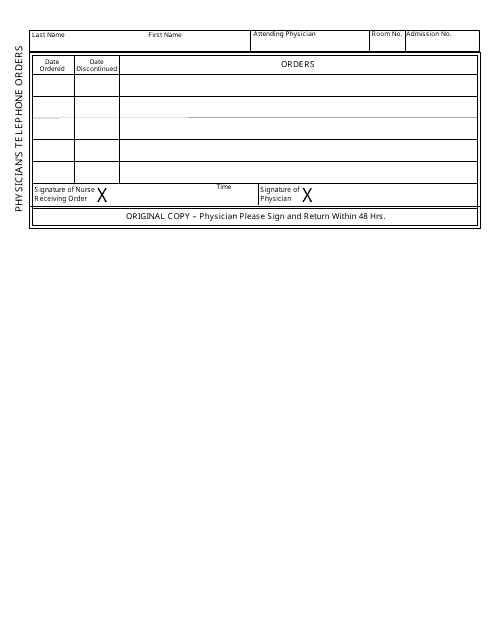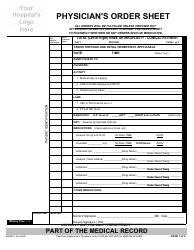Physician's Telephone Orders
Physician's Telephone Orders, commonly found in healthcare settings, refers to orders given by a doctor or physician over the phone regarding a patient's care or treatment. These orders might deal with medication prescriptions, medical procedures or tests, physical therapy routines, lifestyle modifications, and nursing care instructions, among other things. They are usually implemented when the doctor cannot be physically present to give the orders. These orders are typically documented by a registered nurse or other authorized healthcare professional to maintain medical record accuracy and ensure proper patient care. They are later authenticated by the physician.
The physician's telephone orders are typically filed by a registered nurse or medical assistant in a healthcare facility. These professionals are responsible for documenting the orders accurately in the patient's medical records. Any medication, treatment, or care instructions given over the phone by a doctor must be documented and filed promptly to ensure they are implemented as directed and to maintain a comprehensive record of the patient's care.
FAQ
Q: What are Physician's Telephone Orders?
A: Physician's Telephone Orders are directives given by a doctor over the phone to a healthcare professional, like a nurse. These are usually given when the doctor cannot be present in person.
Q: Are Physician's Telephone Orders legally binding?
A: Yes, Physician's Telephone Orders are legally binding and must be followed by the healthcare professional receiving the order.
Q: How are Physician's Telephone Orders documented?
A: Physician's Telephone Orders are documented by the receiving healthcare professional. They write down the instructions as they're given, then read them back to the doctor to make sure they're correct.
Q: What should be included in a Physician's Telephone Order?
A: A Physician's Telephone Order should include the patient's name, the date and time of the call, the order given, and the name of the doctor giving the order.
Q: Can any doctor give Physician's Telephone Orders?
A: Physician's Telephone Orders must be given by the doctor responsible for the care of the patient in question.
Q: Are there any risks associated with Physician's Telephone Orders?
A: There can be risks associated with Physician's Telephone Orders, such as miscommunication or misunderstanding of the order. That's why it's important for the orders to be read back and confirmed.
Q: Can Physician's Telephone Orders be used for prescribing medication?
A: Yes, Physician's Telephone Orders can be used for prescribing medication, as long as it is properly documented and the doctor confirming the prescription is properly licensed.


